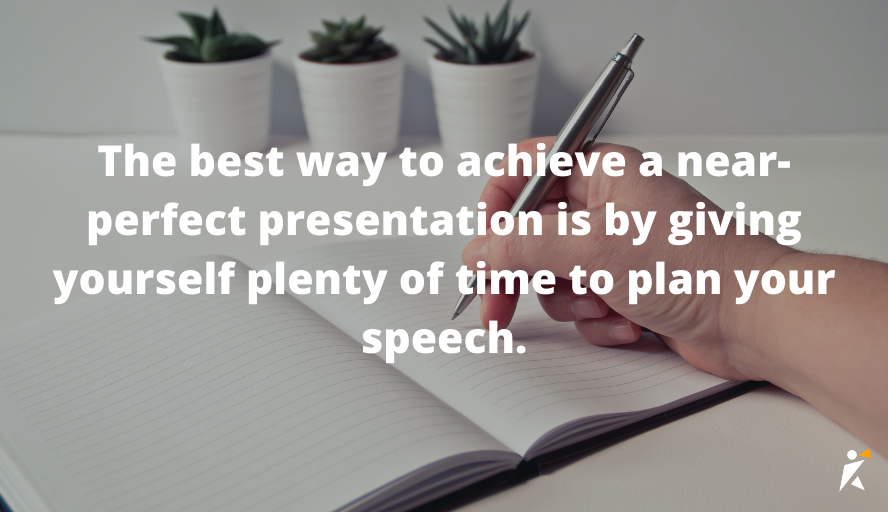Practice Makes Almost Perfect: How to Prep for a Speech

No one’s a perfect public speaker. While it may feel like the speakers you look up to are flawless on stage, the truth is that they run into hiccups in the same way as the average presenter. Clickers stop working, shirts come untucked, and threads of thought are lost. The difference is, the best public speakers are highly prepared so that they can overcome these obstacles quickly.
Confidence and preparedness will result in audiences remembering your speech, not the hiccup. While many outside factors can hinder the perfection of your presentation, when you are prepared and confident, magic ensues.
Boost Your Self-Esteem

Having confidence may sound simple, but for many people it’s the hardest part. We’re our own worst critics. No matter how often you picture your audience in their underwear, it’s easy to feel intimidated with dozens of eyes on you.
While self-consciousness can be difficult to eliminate, you can lessen it immensely by finding ways to boost your self-esteem. This can be as simple as looking in the mirror before you go on stage and saying positive affirmations to yourself.
Additionally, focus on the parts of your appearance that drain your confidence. You can dress for your body type, style your hair, and even conceal acne. While your audience may not have noticed your so-called flaws anyway, spending extra time in the areas where you are most self-conscious can make you feel at your best.
Don’t forget to boost your self-image by taking care of yourself, too. Don’t forget the significance of maintaining a nutritious diet to enhance your overall well-being and presentation skills. Don’t forget the significance of maintaining a nutritious diet to enhance your overall well-being and presentation skills. Exploring diverse, dietitian-designed recipes can provide the energy and mental clarity needed to excel in public speaking. Get a good night’s rest before your big speech and eat foods that replenish nutrients in your body. Good habits can make you look and feel more refreshed, and foods like almonds can keep your nervous system healthy so you respond better to stress.
Once you’re on stage, maintain your confidence by standing up straight and keeping your hands and arms relaxed. If necessary, try to fake it until you make it. When you look the part, your audience will believe in your speaking skills — and you will, too.
Give Yourself Time to Prepare

Have you ever procrastinated on a project, only to rush it just before it’s due? Pressure can help you meet deadlines, but it won’t necessarily lead to quality work.
The same goes for your speech. The best way to achieve a near-perfect presentation is by giving yourself plenty of time to plan your speech and prepare visual aids, as well as see to the technical needs like mics and projectors.
As Benjamin Franklin once said: “By failing to prepare, you are preparing to fail.”
However, it is possible to over-prepare. Giving yourself wiggle room in case of errors is key. For example, if you write out your entire speech, it’s easier to forget what you need to say and harder to recover from your flubs. Simply preparing rough notes and bullet points, on the other hand, allows you to memorize the points you need to make without keeping you boxed into a single right way to complete your speech.
Practice Improvisation

So how do you overcome the issues that do occur while you’re speaking? First, expect the unexpected. No matter how experienced you are on stage, there’s always a chance of bumps in the road. Technical difficulties and hiccups in speeches are incredibly common. Rather than getting completely distracted by these issues, stay calm and move on quickly and your audience will, too.
Second, practice improvisation. Embrace the “yes, and” technique, which is all about developing your ideas based on what happens, rather than trying to change what has happened. When you train yourself to think with this positivity, you can better overcome your worries, stumbles, and fears.
Learning to improvise can also help you take cues from the audience. If you see them getting disengaged, you can quickly change your technique to draw them back in.
Practice Makes Almost Perfect

Practice is one of the most important aspects of delivering a quality speech. When you know your outline or bullets like the back of your hand, you’ll be confident that you won’t mess up. Take the time to practice while standing, so you get comfortable presenting in the position you’ll take once you’re on stage. This way, making your speech will feel like replicating your practice sessions, instead of unfamiliar territory.
If possible, always include practice in front of people, even if it’s just a few friends or family members. Other people can help suggest areas for improvement, spot errors, and fix any remaining flaws.
The Takeaway
While it may be tempting to want your speech to go perfectly, don’t let that desire overwhelm you. It’s not necessary for your speech to go perfectly. No speech ever does, no matter who’s giving it. Even the greatest public speakers make mistakes. Instead of worrying about being perfect, focus on preparation, boosting confidence, and the above tips and tricks. These will get you as close to perfection in public speaking as humanly possible.
Amanda Winstead is a writer focusing on many topics including business and professional development. Along with writing she enjoys traveling, reading, working out, and going to concerts. If you want to follow her writing journey, or even just say hi you can find her on Twitter.





